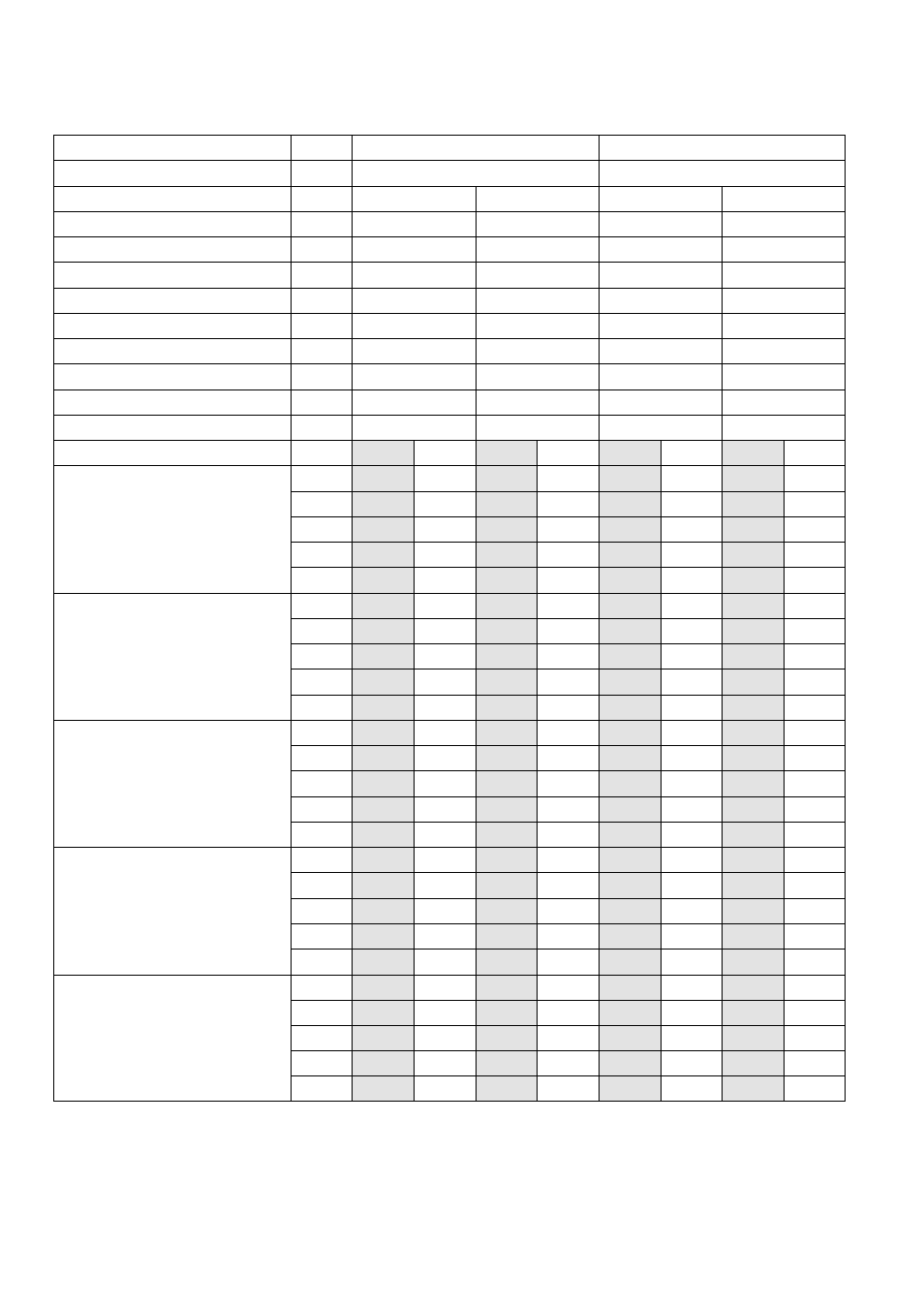50/40 °c, 60/50 °c, 70/50 °c – REMKO PWW 5000 User Manual
Page 8: 80/60 °c, 90/70 °c

8
Technical Data PWW 5102 / 5202
2 steps
2 steps
Type
5102
5202
Speed
U/min.
910
720
890
710
Electrical connection
Volt
3 x 400
3 x 400
3 x 400
3 x 400
Frequency
Hz
50
50
50
50
Power consumption
kW
0,05
0,033
0,11
0,07
Rated current
A
0,13
0,07
0,28
0,15
Air capacity
m³/h
1550
1200
2470
1900
Sound pressure level L
pA
1m
1)
dB(A)
51
45
54
47
Max. heat projection range
m
3,5
2,6
3,6
2,7
Heating medium connection
inch
R 1“
R 1“
R 1“
R 1“
Weight
kg
25
25
32
Heating medium
2)
t
L1
°C
kW
t
L2
°C
kW
t
L2
°C
kW
t
L2
°C
kW
t
L2
°C
50/40 °C
0
11,5
23
9,9
25
16,4
21
14,5
23
5
10,2
26
8,8
28
14,6
24
12,8
26
10
8,7
28
7,6
30
12,6
26
10,9
28
15
7,3
31
6,3
32
10,5
29
9,2
30
20
5,9
33
5,2
34
8,5
31
7,4
33
60/50 °C
0
14,6
29
12,7
32
21,0
26
18,3
29
5
13,3
32
11,5
34
19,1
29
16,7
32
10
11,8
35
10,2
37
17,0
32
14,8
34
15
10,3
37
8,9
39
14,8
35
12,9
37
20
8,9
39
7,7
41
12,7
37
11,1
39
70/50 °C
0
14,8
30
12,8
32
21,1
27
18,5
29
5
13,5
33
11,8
35
19,2
30
17,0
32
10
12,1
35
10,6
38
17,4
33
15,3
35
15
10,6
36
9,4
40
15,2
34
13,5
38
20
9,4
40
8,1
42
13,4
38
11,8
40
80/60 °C
0
17,8
36
15,5
39
25,5
32
22,3
35
5
16,5
39
14,5
42
23,8
35
20,9
39
10
15,2
42
13,2
*44
21,7
38
19,0
41
15
13,7
*44
11,9
*47
19,7
41
16,8
*43
20
12,3
*47
10,7
*49
17,6
*44
15,5
*46
90/70 °C
0
21,0
42
18,2
*46
30,1
38
26,3
42
5
20,2
*46
17,2
*49
28,3
41
24,9
*45
10
18,3
*48
15,8
*51
26,2
*44
23,0
*48
15
16,4
*50
14,6
*54
24,0
*47
21,1
*50
20
15,1
*53
13,3
*56
22,0
*50
19,2
*53
32
1) Noise measurement DIN 45635 - 01 - KL 3
2) t
L1
= incoming air temperature, t
L2
= outgoing air temperature
* For outgoing air temperatures above 42 °C a very strong thermal lift can form. The penetration depth of the warm air stream becomes shorter,
the cold air in the area where people are working cannot be adequately permeated and mixed by the warm air.
Temperature layers from bottom to top are the result. Pockets of cold air form in the area where people are working near the ceiling
Excessive buildup of heat (heat loss).
